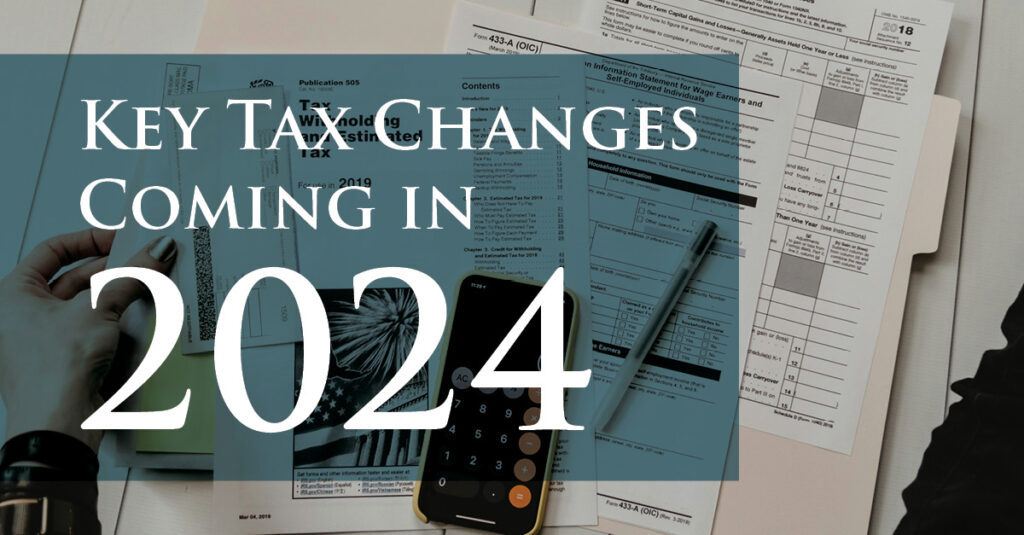
While it has often been observed that “nothing is certain except death and taxes,” the tax liabilities that individuals and businesses incur aren’t certain from year to year. Instead, the U.S. tax code changes annually, and those who don’t take time to learn about each year’s key adjustments can find themselves paying more than they need to. As a result, it’s important for all taxpayers to explore the primary ways in which the tax code is changing as 2024 dawns.
In this article, the reputable CPAs at Ferguson Timar discuss the key tax changes occurring in 2024. Whether you have complex holdings and proactive tax planning is key to managing your wealth, or you simply want to limit the amount of your hard-earned income that you’ll need to hand over to Uncle Sam on Tax Day 2024 and Tax Day 2025, reviewing the information below can help you make informed decisions about your finances this coming year.
Tax Day
In 2023, the majority of filers had until April 18 to submit their tax returns to the Internal Revenue Service. This nationwide extension was implemented because April 15—which is traditionally Tax Day in the U.S.—fell on a Saturday and so IRS employees based in Washington D.C. could honor the district’s Emancipation Day on April 17.
In 2024, Tax Day returns to an April 15 observance for stateside taxpayers, save for residents of Massachusetts and Maine, who are permitted an extension until April 17 because of state holidays. Individual filers who request a filing extension are permitted to file their returns until October 15.
Inflation Adjustments
One of the primary reasons why annual tax code changes impact taxpayers is the IRS publishes inflation adjustments to key rates and deductions each year. The following 2024 tax code changes will apply to tax returns filed in 2025, which will affect the strategic financial planning of forward-thinking taxpayers throughout 2024:
- The 2024 inflation adjustment rate is 5.4%. This is lower than 2023’s 7.1% increase, but it is still one of the most significant hikes the IRS has implemented in years and is higher than the broader inflation rate.
- A significant rise in the standard deduction will help taxpayers keep more of their income in their pockets. Single filers will enjoy a $750 increase to $14,600, and married couples filing jointly will benefit from an additional $1,500 to $29,200.
Tax Bracket Adjustments
While the marginal rates of the seven tax brackets remain the same, adjustments to the income levels required for inclusion into each bracket are changing. These adjustments will help some Americans whose wages may have risen somewhat to remain in a lower bracket.
In 2024, single filers will fall into the following marginal rate brackets based on their income level:
- 10% – $0 to $11,600
- 12% – $11,601 to $47,150
- 22% – $47,151 to $100,525
- 24% – $100,526 to $191,950
- 32% – $191,951 to $243,725
- 35% – $243,726 to $609,350
- 37% – $609,351 or more
In 2024, married couples filing jointly will fall into the following marginal rate brackets based on their income level:
- 10% – $0 to $23,200
- 12% – $23,201 to $94,300
- 22% – $94,301 to $201,050
- 24% – $201,051 to $383,900
- 32% – $383,901 to $487,450
- 35% – $487,451 to $731,200
- 37% – $731,200 or more
Additional Credit, Exclusion, and Deduction Adjustments of Note
The IRS consistently adjusts seemingly random provisions of the tax code each year. While some of these adjustments are minor—and some are fairly obscure—those whom they affect need to know about them to maximize their returns and minimize their liability overall. Potpourri adjustments of note in 2024 include the following:
- The annual federal gift exclusion is increasing $1,000 to $18,000.
- The foreign earned income exclusion is increasing $6,500 to $126,500.
- The adoption cost credit is increasing nearly $1,000 to $16,810 of qualified expenses.
- The basic exclusion amount for estates of decedents who pass away during 2024 is increasing $690,000 to $13,610,000.
Allow Ferguson Timar CPAs to Help You Plan Strategically for the Upcoming Tax Year
Although these are the primary tax code changes for 2024 most likely to affect the majority of Americans, many filers should be aware of a host of additional changes. Additionally, tax code changes for the 2023 tax year are soon to become pressing business as individuals and businesses draft their returns due on April 15.
Whether you’re concerned about minimizing your individual tax liability, or you’re more concerned about your business tax obligations, the CPAs at Ferguson Timar are ready to assist. Contact our experienced team today at (714) 204-0100 for personalized tax guidance tailored uniquely to your financial goals and circumstances. We look forward to working with you.
